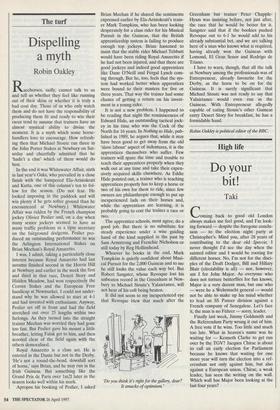The turf
Dispelling a myth
Robin Oakley
Racehorses, sadly, cannot talk to us and tell us whether they feel like running out of their skins or whether it is truly a bad coat day. Those of us who only watch them and do not have the responsibility of producing them fit and ready to win their races tend to assume that trainers have an almost mystical ability to divine the moment. It is a myth which some horse- handlers love to encourage. How refresh- ing then that Michael Stoute ran three in the John Porter Stakes at Newbury on Sat- urday and cheerfully admitted that he `hadn't a clue' which of them would do best.
In the end it was Whitewater Affair, sixth in last year's Oaks, who prevailed in a close finish with the hampered Ela-Aristokrati and Kutta, one of this column's ten to fol- low for the season. (Do not fear. He looked imposing in the paddock and will win plenty if he gets softer ground than he encountered at Newbury.) Whitewater Affair was ridden by the French champion jockey Olivier Peslier and, on a day when many senior jockeys seemed to have as many traffic problems as a tipsy secretary on the fairground dodgems, Peslier pro- duced an outstanding performance to win the Arlington International Stakes on Brian Meehan's Royal Amaretto.
I was, I admit, taking a particularly close interest because Royal Amaretto had last autumn finished second in the Horris Hill at Newbury and earlier in the week the first and third in that race, Desert Story and Hidden Meadow, had won respectively the Craven Stakes and the European Free handicap at Newmarket. I could not under- stand why he was allowed to start at 4-1 and had invested with enthusiasm. Anyway, Peslier set off in front and had the field stretched out over 25 lengths within two furlongs. As they turned into the straight trainer Meehan was worried they had gone too fast. But Peslier gave his mount a little breather, letting Falak get to him, and then scooted clear of the field again with the others demoralised.
Royal Amaretto is a class act. He is entered in the Dante but not in the Derby. `He's not a round-the-bend, downhill sort of horse,' says Brian, and he may run in the Irish Guineas. But something like the Grand Prix de Paris over lm2f later in the season looks well within his mark.
Apropos his booking of Peslier, I asked Brian Meehan if he shared the sentiments expressed earlier by Ela-Aristokrati's train- er Mark Tompkins, who has been looking desperately for a class rider for his Musical Pursuit in the Guineas, that the British apprenticeship system is failing to produce enough top jockeys. Brian hastened to insist that the stable rider Michael Tebbutt would have been riding Royal Amaretto if he had not been injured, and that there are good jockeys and indeed good apprentices like Dane O'Neill and Fergal Lynch com- ing through. But he, too, feels that the sys- tem had worked better when apprentices were bound to their masters for five or three years. That way the trainer had some chance of getting a return on his invest- ment in a young rider.
It is not a new problem. I happened to be reading that night the reminiscences of Edward Hide, an outstanding tactical jock- ey in his time who was the Cock of the North for 16 years. In Nothing to Hide, pub- lished in 1989, he argues that, while it may have been good to get away from the old `slave labour' aspect of indentures, it is the apprentices themselves who suffer. Few trainers will spare the time and trouble to teach their apprentices properly when they walk out at any time and take their expen- sively acquired skills elsewhere. As Eddie Hide pointed out, a trainer who is teaching apprentices properly has to keep a horse or two of his own for them to ride, since few owners are philanthropic enough to put up inexperienced lads on their horses and, while the apprentices are learning, it is probably going to cost the trainer a race or two.
The apprentice schools, most agree, do a good job. But there is no substitute for steady experience under a wise guiding hand of the kind supplied in the past by Sam Armstrong and Frenchie Nicholson or still today by Reg Hollinshead.
Whoever he books in the end, Mark Tompkins is quietly confident about Musi- cal Pursuit for the 2,000 Guineas and to me he still looks the value each way bet. But Robert Sangster, whose Revoque lost his unbeaten record in the Greenham at New- bury to Michael Stoute's Yalaietanee, will not hear of his colt being beaten.
It did not seem to my inexperienced eye that Revoque blew that much after the Do you think it's right for the gallery, dear? It smacks of optimism.' Greenham but trainer Peter Chapple- Hyam was insisting before, not just after, the race that he would be better for it. Sangster said that if the bookies pushed Revoque out to 6-1 he would add to his already substantial bet, and we are talking here of a man who knows what is required, having already won the Guineas with Lomond, El Gran Senor and Rodrigo de Triano.
I have to warn, though, that all the talk at Newbury among the professionals was of Entrepreneur, already favourite for the Derby, as the horse to be on for the Guineas. It is surely significant that Michael Stoute was not ready to say that Yalaietanee would even run in the Guineas. With Entrepreneur allegedly capable of eating Stoute's other Guineas entry Desert Story for breakfast, he has a formidable hand.
Robin Oakley is political editor of the BBC.


































































 Previous page
Previous page